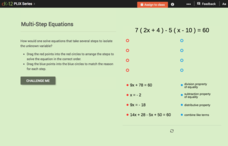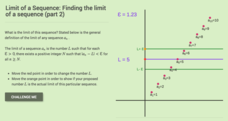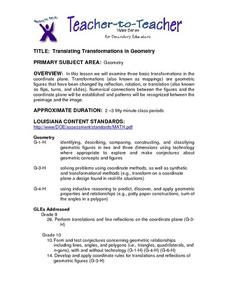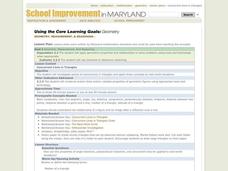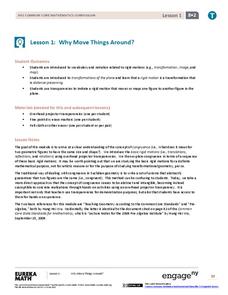Curated OER
Shapes and Angles
Are your geometry whizzes learning about angles and shapes? This online activity gives 10 multiple choice questions based on images and word problems. Concepts include deducting angle degree, classifying shapes, and identifying angle...
Curated OER
Special Symbols
Bridge the gap between the term "take away" and the actual subtraction symbol using these illustrated practice problems. For each, youngsters see the number sentence in three ways: images of birds on twigs, written out in word form, and...
CK-12 Foundation
Factoring by Grouping: Polynomials
Investigate the process of factoring polynomials by grouping. A detailed lesson initially has learners follow a set-by-step example. They then drag terms to complete the three steps of a new problem.
CK-12 Foundation
Factorization of Quadratic Expressions: Boxes for Factoring
Create rectangles from the terms of a trinomial. The interactive provides virtual algebra tiles for participants to use to create quadratic trinomials. Pupils use the tiles and arrange them into a rectangle to find the factors of the...
CK-12 Foundation
Addition of Polynomials: Splitting into Tiles
Count on tiles to add polynomials. Pupils drag virtual algebra tiles onto colored mats to represent the sum of two polynomials. The learners count the number of like tiles to find the coefficient of each term. They finish...
CK-12 Foundation
Discrete Random Variables: Roll the Dice!
And the winner is ... not always who it appears to be. An interactive gives the directions for a dice game that on the surface gives one player an advantage over the other. Pupils look closer at the possible outcomes and find the...
CK-12 Foundation
Multi-Step Equations
It's important to know why each step in solving an equation works. Scholars order the steps and reasons when solving a multi-step equation. Solutions require using the distributive property, combining like terms, and using properties of...
CK-12 Foundation
Number Patterns: Square Sizes
Size up an interactive on square sizes. Scholars adjust the side length of a square to represent the next term in a geometric pattern. They answer a set of challenge questions on the pattern to complete the activity.
CK-12 Foundation
Sequence: The Sequence Calculator
Work through a sequence in discovering number patterns. Using the interactive, pupils explore arithmetic and geometric sequences by setting the initial value and the common difference or ratio. Learners distinguish between the two types...
CK-12 Foundation
Limit of a Sequence: Finding the Limit of a Sequence (Part 2)
What does it mean if young mathematicians cannot put the squeeze on a sequence? Learners investigate a divergent sequence and find the formula for the nth term. Using the definition of a limit of a sequence, pupils try to find the limit...
Curated OER
Crazy for Cubes: Art and Science
Learners discuss Sol LeWitt and conceptual art, then analyze the differences in expressing a concept through model-based inquiry and aesthetic art criticism. They develop a geometric, scientific, or mathematical concept, then create an...
Curated OER
Math Club #16: Knot Theory
In this math club #16: knot theory worksheet, 9th graders read about knot theory, analyze diagrams of knots, make knots to match the diagrams and answer 6 questions about advanced knots.
Curated OER
Translating Transformations in Geometry
Students create an image using given coordinates and evaluate how the coordinates change when a slide or rotation takes place.
Curated OER
Mathematics of Image Processing Project
In this image processing worksheet, students complete 4 steps related to image processing. First, they work in teams of 2-3 and create a hard copy report and documented m-files. Then, students try compression at various quality levels...
Curated OER
Science and Math Lab (Students Look at Symmetry in Nature)
Students study patterns. In this symmetry in nature lesson, students examine objects to determine what type of symmetry they have. They work in small groups to rotate through stations that have objects for them to study.
Curated OER
Bar Graph
In this bar graph worksheet, students answer short answer quesitons about a bar graph titled "Adam and his Toys". Students complete 6 short answer questions.
Curated OER
Symmetry in Butterflies
Young scholars create a butterfly displaying a mirror image of itself to show that it is symmetrical. For this symmetry lesson plan, students go over symmetry in different shapes and identify patterns in butterflies.
Curated OER
Concurrent Lines in Triangles
Students explore the concept of concurrent lines in triangles. In this concurrent lines in triangles lesson, students work in groups to investigate properties of concurrent lines in acute, right, and obtuse triangles. Students use a...
Curated OER
Bar Graph
In this bar graph activity, 2nd graders answer short answer questions about how many animals are in each section of the bar graph. Students answer 6 questions.
Curated OER
Mother Nature Pattern Maker
Young scholars in a teacher education program enhance their awareness of patterns. They discover how to support their students in developing this skill in mathematical terms. They role play the role of a K-2 student and collect images...
Mathematics Vision Project
Module 7: Modeling with Functions
The sky's the limit of what you create when combining functions! The module begins with a review of transformations of parent functions and then moves to combining different function types using addition, subtraction, and...
EngageNY
Why Move Things Around?
Explore rigid motion transformations using transparency paper. Learners examine a series of figures and describe the transformations used to create the series. They then use transparency paper to verify their conclusions.
Virginia Department of Education
Slope-2-Slope
Pupils build on previous experience with slope to investigate positive, negative, zero, and undefined slope. They complete a puzzle matching slope-intercept and standard forms of linear equations.
Curated OER
A Day in the Life
Students inquire about the politics and culture of Ancient Rome. In this Ancient Rome project/unit, students research life during ancient Roman times and create a newspaper with articles on politics, sports, culture, and economics.






